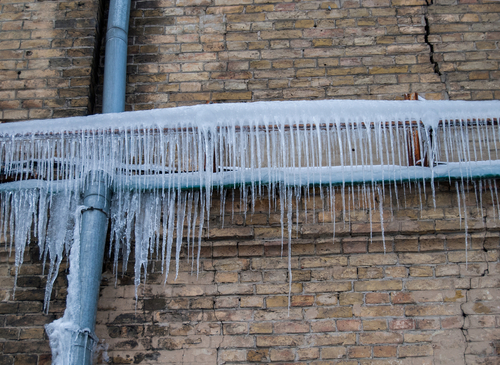Any individual maintains their personal rationale with regards to How To Avoid Freezing Pipes.

Cold weather can damage your plumbing, especially by freezing pipelines. Right here's exactly how to avoid it from occurring and what to do if it does.
Introduction
As temperature levels decrease, the danger of frozen pipelines rises, possibly bring about pricey repair services and water damage. Understanding how to prevent icy pipes is crucial for home owners in cool climates.
Avoidance Tips
Protecting vulnerable pipelines
Cover pipelines in insulation sleeves or make use of warm tape to safeguard them from freezing temperatures. Concentrate on pipes in unheated or exterior locations of the home.
Home heating methods
Maintain indoor areas sufficiently heated, specifically areas with pipes. Open closet doors to allow warm air to flow around pipes under sinks.
Just how to recognize frozen pipes
Try to find lowered water circulation from faucets, unusual odors or noises from pipes, and visible frost on subjected pipes.
Long-Term Solutions
Structural modifications
Think about rerouting pipelines away from exterior walls or unheated areas. Include added insulation to attic rooms, cellars, and crawl spaces.
Upgrading insulation
Invest in top quality insulation for pipes, attic rooms, and wall surfaces. Appropriate insulation helps keep regular temperatures and reduces the threat of frozen pipelines.
Shielding Outside Plumbing
Yard hoses and exterior faucets
Separate and drain pipes garden hoses prior to winter season. Install frost-proof spigots or cover exterior taps with shielded caps.
Comprehending Frozen Pipelines
What causes pipes to freeze?
Pipes ice up when exposed to temperatures listed below 32 ° F (0 ° C) for prolonged periods. As water inside the pipes freezes, it increases, taxing the pipe walls and potentially triggering them to rupture.
Dangers and problems
Icy pipes can cause water supply disruptions, property damages, and pricey repairs. Burst pipes can flood homes and trigger substantial architectural damages.
Indications of Frozen Water Lines
Recognizing icy pipelines early can avoid them from rupturing.
What to Do If Your Pipes Freeze
Immediate actions to take
If you think frozen pipes, maintain taps available to ease pressure as the ice melts. Make use of a hairdryer or towels taken in hot water to thaw pipelines gradually.
Conclusion
Preventing icy pipes requires aggressive steps and fast actions. By understanding the reasons, indications, and safety nets, property owners can protect their plumbing throughout cold weather.
Helpful Tips to Prevent Frozen Pipes this Winter
UNDERSTANDING THE BASICS: WHY PIPES FREEZE AND WHY IT’S A PROBLEM
Water freezing inside pipes is common during the winter months, but understanding why pipes freeze, and the potential problems it can cause is crucial in preventing such incidents. This section will delve into the basics of why pipes freeze and the associated problems that may arise.
THE SCIENCE BEHIND FROZEN PIPES
When water reaches freezing temperatures, it undergoes a physical transformation and solidifies into ice. This expansion of water as it freezes is the primary reason pipes can burst. As the water inside the pipe freezes, it expands, creating immense pressure on the walls. If the pressure becomes too great, the pipe can crack or rupture, leading to leaks and water damage.
FACTORS THAT CONTRIBUTE TO PIPE FREEZING
Low Temperatures: Extremely cold weather, especially below freezing, increases the risk of pipes freezing. Uninsulated or Poorly Insulated Pipes: Pipes located in unheated areas, such as basements, crawl spaces, or attics, are more prone to freezing. Insufficient insulation or lack of insulation altogether exacerbates the problem. Exterior Wall Exposure: Pipes running along exterior walls are susceptible to freezing as they encounter colder temperatures outside. Lack of Heating or Temperature Regulation: Inadequate heating or inconsistent temperature control in your home can contribute to frozen pipes. PROBLEMS CAUSED BY FROZEN PIPES
- Pipe Bursting: As mentioned earlier, the expansion of water as it freezes can cause pipes to burst, resulting in significant water damage.
- Water Damage: When pipes burst, it can lead to flooding and water damage to your property, including walls, ceilings, flooring, and personal belongings.
- Structural Damage: Prolonged exposure to water from burst pipes can compromise the structural integrity of your home, leading to costly repairs.
- Mold and Mildew Growth: Excess moisture from water damage can create a favorable environment for mold and mildew growth, posing health risks to occupants.
- Disrupted Water Supply: Frozen pipes can also result in a complete or partial loss of water supply until the issue is resolved.
WHY CERTAIN PIPES ARE MORE PRONE TO FREEZING
- Location: Pipes located in unheated or poorly insulated areas, such as basements, crawl spaces, attics, or exterior walls, are at higher risk of freezing.
- Exterior Pipes: Outdoor pipes, such as those used for irrigation or exposed plumbing, are particularly vulnerable to freezing as they are directly exposed to the elements.
- Supply Lines: Pipes that carry water from the main water supply into your home, including the main water line, are critical to protect as freezing in these lines can affect your entire plumbing system.
- Underground Pipes: Pipes buried underground, such as those connected to sprinkler systems or outdoor faucets, can be susceptible to freezing if not properly insulated.
https://busybusy.com/blog/helpful-tips-to-prevent-frozen-pipes-this-winter/

Hopefully you enjoyed our article about How To Avoid Freezing Pipes. Many thanks for taking a few minutes to read through our article post. Sharing is good. Helping people is fun. Thank you for your time spent reading it.
Call Today